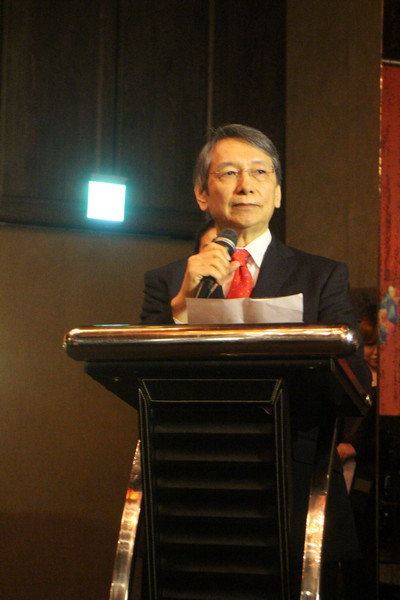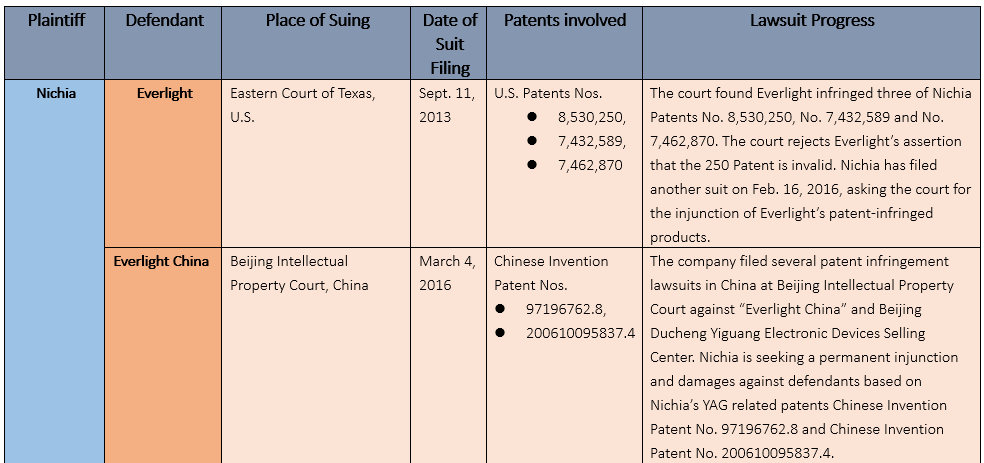Nichia announced several LED patent lawsuits this week, including its two patent infringement suits filed against TV manufacturer Vizio in Eastern Court of Texas and District Court for the Central District of California in U.S., and ongoing YAG patents lawsuit against Everlight China. The lawsuit filed against Vizio stands out in particular, since it targets the end product manufacturer instead of a LED chip or component supplier.
During a press conference on Thursday at Palais de Chine Hotel in Taipei, Taiwan, Katsuyuki Akutagawa,Chief Legal & IP Officer and Company Board Director of Nichia, spoke about the suit filed against Vizio in Eastern Court of Texas, explaining they wanted to stop LED backlight end product manufacturers from using illegal chips. “We want all LED users to use legal (patented) LEDs,” he said.
 |
|
Katsuyuki Akutagawa,Chief Legal & IP Officer and Company Board Director of Nichia. (LEDinside) |
In 2015, nearly 30% of LED chips manufactured by vendors were used for backlight applications in computer monitors, smartphone, laptops and TV displays, according to statistics compiled by LEDinside. These applications make up a considerable amount of orders and shipment volumes for LED manufacturers, but it can be difficult to identify the LED chip used once it is incorporated in the end products.
“It’s not like the LED chips in backlight products hae a brand label on it, it is actually very difficult to identify and prove who the chip supplier is,” said Akutagawa. “Even LED chip manufacturers might be unable to recognize the LED chips in the end-products.”
The most manufacturers can do is tear down the LED chip and deduce who the potential supplier is from the chip structure. In the ongoing patent infringement cases against Vizio in Texas, Nichia found the LED chip used for TV backlight had the same shape and structure design as their own LED chips. “It was evident copying was involved,” said Akutagawa.
 |
 |
|
(Sources: Nichia and Law360) |
Nichia’s filed suit against Vizio in the Eastern Court of Texas claims the LED chips have a similar manufacturing process to Everlight’s patent infringed LED chips XI3030. The same court ruled on Jan. 28, 2016, Everlight’s XI3030, XI3535, 62-217D, 62-257D, and 45-21S series of LED products had infringed Nichia’s U.S. Patent No. 8,530,250 (250 patent). Akutagawa, however, declined to identify who the suspected chip supplier was during the interview on Thursday. “We can only speculate who the chip maker is,” he commented.
The Japanese manufacturer has chosen not to state the defendant in press release statements it released on March 21 and March 24, but legal and patent media in the U.S. have identified the defendant in both cases to be Vizio.
This makes it very difficult for manufacturers to sue competing vendors over alleged patent infringement, instead end-product manufacturers bear the brunt of using patent-infringed components, as observed from Nichia’s lawsuit against Vizio.
Nichia’s recent lawsuit against Vizio has led market insiders in Taiwan to speculate it will affect many local backlight suppliers, but from Japanese company’s perspective the decision to target an end product manufacturer is partly based on the difficulty of proving the LED chip supplier. While the strategy appears to make the end-product manufacturer the scapegoat, it aims to stem the demand for LED chips that lack patent protection. It could have serious implications for manufacturers that lack patented LED chips, and even raise end product costs, but overall it is a strategy that innovative companies must take to survive in the increasingly challenging LED market.
(Author: Judy Lin, Chief Editor, LEDinside)
Additional sources:
Nichia’s v.s. Vizio lawsuit














